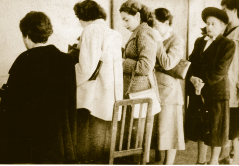27 Mayo, 2020
Marcos Cueto| Professor at the Oswaldo Cruz Foundation in Rio de Janeiro and scientific editor of HCSM
Some historical studies on Latin American epidemics during the 20th century have analyzed the legacy of official responses and are important to offer an understanding of the political reactions to COVID-19 in the region (Cueto & Palmer, 2016). This legacy is encompassed by the concept of a “Culture of Survival” based on the assumption that the control of epidemic diseases has been, above all, a technological matter whose compliance depended on a handful of experts. It was assumed that “rationality” would prevail over other health practices such as domestic, indigenous, Asian or African-American medicines condemned as primitive by states. A technological stamp relegated the construction of solid sanitary systems and disdained community participation in them. The celebratory trumpets of technology announced the control of epidemics without improving the living conditions of the majority of populations. It was not the responsibility of health workers to fight for social reform, rather just the matter of attending to emergencies with available resources.

Marcos Cueto is a professor at the Oswaldo Cruz Foundation in Rio de Janeiro. He is editor of the journal História, Ciências, Saúde – Manguinhos and author, with Theodore Brown and Elizabeth Fee, of The World Health Organization, a history. Cambridge: Cambridge University Press, 2019.
In this fashion, responses to epidemics have been palliative, vertical and authoritarian where elites knew what was best for society. Temporary provisions normalized that some people did not have full access to health infrastructure, in other words, that they were not considered full citizens. In some cases, the efficacy of hygienic behavior has been exaggerated to argue that the poor – who did not follow such behavior – were to blame for their own fate (without questioning why it was difficult to follow it in poor neighborhoods). In brief, a limited perception of public health was promoted; a temporary exit from emergencies. And short-term expectations were created that supposed that official healthcare was nothing more than a handout, such as fumigation, vaccinations, medicines and hospitals, so that the less fortunate could survive. In this way, resignation towards disease increased and hegemonic healthcare ceased to be an activity that ensured what was expected of it under the best versions of capitalism. That is, that it guarantees equal opportunities, contributing to individual progress based on talent and effort; regardless of markers of origin (such as place, social class, gender or ethnicity).
One feature of a “Culture of Survival” that has wickedly reappeared in a Brazil hit by COVID-19 is President Jair Bolsonaro’s obsession with chloroquine, which is more than a cultural war between scientists in favor of quarantine and authoritarian politicians who oppose social distancing. It possesses an important political dimension that fuels both the pandemic and the political pandemonium that is raging through the country. As a country with 210 million inhabitants and more than 391,000 confirmed cases and 24,512 deaths (as of 26 May, 2020), it is the largest and most affected Latin American nation to be hit by the coronavirus.
In spite of differences that exist between chloroquine and hydroxychloroquine – the former is more toxic than the latter – Bolsonaro praised both medications and continued to do so after his admired Donald Trump stopped celebrating them. His attitude is linked to his opposition to confinement. A few weeks after the first Brazilian case (26 February, 2020) the president defended a so-called “vertical” quarantine (the confinement of risk groups like the elderly and different from the “horizontal” quarantine practiced in the rest of the world). In the first days of April, when it was clear that neither the horizontal nor vertical were being implemented uniformly, he embraced treatment in his fierce combat against the state governors who had unilaterally closed schools, shops and means of transportation, to stop the expansion of the coronavirus.
“Chloroquine,” as it was simply called in Bolsonarist speeches was a drug known in Brazil for its use against malaria, a widespread rural disease. This familiarity, added to the arguments that it was cheap and harmless and to the expression “there is nothing to lose,” justifying the use of the medicines. Propaganda occurred despite doubts about its effectiveness and dangerous cardiovascular side effects such as heart rhythm problems. In this way, a pattern of temporary solutions typical of a “Culture of Survival” has been reproduced. In early April, Bolsonaro claimed that chloroquine was only for severe cases, but shortly afterwards he recommended it under any circumstances. Concurrently, the president pressured the regulatory agency Anvisa (Agência Nacional de Vigilância Sanitária (Brazilian Health Regulatory Agency) to authorize it, abolished taxes on imports for drug with chloroquine, bought raw materials from India to manufacture it in Brazil, and dictated that the Army laboratory produce more than a million chloroquine tablets (a notable increase because in 2019, 250 thousand tablets were produced in Brazil).
What was important for Bolsonaro -as in other cases of a “culture of survival”- was to show that his government was doing something tangible and understandable for the poor, that is, offering a gift and raising hopes of a miraculous “magic bullet.” In this way, the president avoided negotiating with other political actors to develop a coherent response (and less did he consider changing the living conditions that made the poor the most vulnerable during this pandemic). For the Bolsonaristas, everything is part of a fierce political dispute that involves pitting supposedly “humanitarian” anti-system leaders against “traditional” and “insensitive” scientists and politicians. The obsession with chloroquine was one of the main reasons for the departure of two Health Ministers (Luiz Henrique Mandetta and Nelson Teich who were both dismissed or resigned on 16 April and 15 May respectively). Both had recommended caution in the use of chloroquine. This was confirmed in mid-May when the Journal of the American Medical Association and The New England Journal of Medicine demonstrated the irrelevance of chloroquine, even when it was used with azithromycin (Jucá 2020). Such evidence was ignored by the Bolsonaristas and this was characterized by their scientific denialism (at the end of March) Bolsonaro came to affirm that the pandemic was nothing more than a little cold. Although he did not make a statement after Teich’s departure, he broadcast on Twitter a video of “how to get immunity” where a doctor assures that the fate of a person in the pandemic is the result of their immunity; that is, the fragility of the people is an explanatory factor of mortality regardless of social distancing. Thus, the glorification of chloroquine complements the Bolsonarist conviction that COVID-19 would inevitably infect 70% of the population.
Bolsonaro’s stubbornness with chloroquine serves his political ends. A heterodox solution encourages a messianism cultivated by a ruler who claims that his presidency is comparable to the ordeal of religious leaders like Jesus Christ. It is also a way to ask for unconditional loyalty from his followers who must oppose the “tyranny” of governors’ confinement orders. The crisis is also an opportunity for him to execute his desire to impose himself on everyone. According to the president – an admirer of military dictatorships – his right to apply chloroquine is not appealable because he is the “commander” of the country. No less important is the fact that this diverts attention from the investigations against him for his abusive interference in the Federal Police that could precipitate an impeachment.
If the Brazilian president is successful with chloroquine – thus a low mortality is actually due to the natural recovery of the majority of people who become infected with the virus – he will claim a personal victory and perhaps improve his chances to stay in power. If he fails, his obsession with chloroquine and other factors of the Brazilian pandemic and pandemonium may end in his political self-destruction. Hopefully this failure will not be at the cost of more lives or the surreptitious return to health patterns of a Culture of Survival.
1 June, 2020
(Translated by Mario Lopez)
References
Cueto, Marcos and Palmer. 2016. Steve. Medicine and Public Health in Latin America A History. New York: Cambridge University Press.
Berlivet, Luc and Lowy, Ilana. 2020. The problem with chloroquine. Epistemologists, methodologists, and the (mis)uses of medical history. In Revista História, Ciências, Saúde – Manguinhos (Blog). 29 April, 2020. (Accessed 11 May, 2020).
Jucá, Beatriz. 2020. Brasil perde segundo ministro da Saúde sob pressão de Bolsonaro para abrir economia e por uso da cloroquina (Brazil loses second health minister under Bolsonaro pressure to open economy and use chloroquine). El País. May 15, 2020. (Acccessed 16 May, 2020).
Citation
Marcos Cueto. 2020. “Epidemics in Latin America and Chloroquine in Brazil in historical perspectives” CSEAS NEWSLETTER, 78: TBC.










